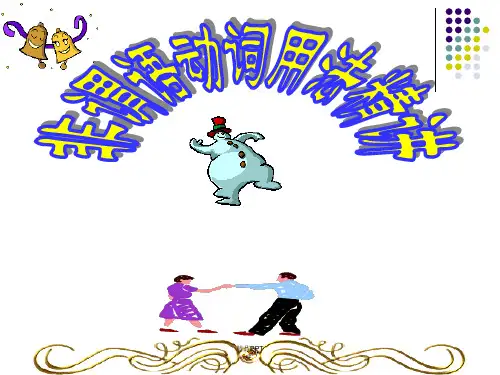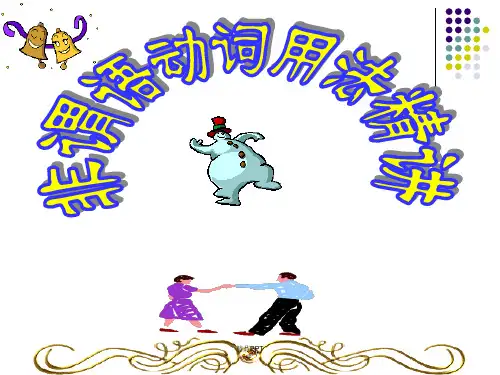[第5讲]故事类记叙文精讲+非谓语动词(上)
- 格式:pdf
- 大小:1.10 MB
- 文档页数:21











高三英语目标班第2讲读名言学语法—情态动词,虚拟语气A fox may grow gray, but never good.Books and friends should be few but good.Experience must be bought.Keep good men company and you shall be of the number.Things at the worst will mend.Time lost cannot be won again.Life is fine and enjoyable, yet you must learn how to enjoy tine life.We must accept finite disappointment, but we must never lose infinite hope.If we cannot get what we like, we have to like what we can get.We needn‟t guard against one who calls himself a thief, but we should watch out for one who calls himself an upright gentleman.Never write what you dare not signEverything ought to be beautiful in a human being: face, and dress, and soul,and ideas.If you would know the value of money, go and try to borrow some.It seems as if a man‟s weak points might develop from his strong points. If his strong points were exaggerated, or found expression at a wrong time or in a wrong place, they might become weak points.Life would be too smooth if it had no rubs in it.If the world were perfect, how could we enjoy the pleasure and comfort of being successful?If l had read as much as other men, I should have known no more than they.He was like a cock who thought the sun had risen to hear him crow.If things were to be twice, all would be wise.The bird wishes it were a cloud. The cloud wishes it were a bird.It is no more necessary that a man should remember the different dinners and suppers which have made him healthy than the different books which have made him wise.If it were not for hope, the heart would break.If it weren't for the rocks in its bed, the stream would have no song.|高三·目标班·教师版| 第2讲| 高三·目标班·教师版| 第2讲第一部分:听力第一节 (共5小题;每小题1.5分,共7.5分)听下面5段对话。
每段对话后有一个小题,从题中所给的A 、B 、C 三个选项中选出最佳选项,并标在试卷的相应位置。
听完每段对话后;你都有10秒钟的时间来回答有关小题和阅读下一小题。
每段对话仅读一遍。
1. What is the man's son wild about?A. Going to school.B. Nothing. C . Computer games.2. What does the woman think about the plan?A. Very practical.B. She thinks it won't be a success.C. She has no opinion, because she hasn't thought about it.3. What does the woman mean?A. She liked film.B. She did not like the film.C. She did not have an opinion, because she didn't care.4. According to the man's opinion, what is the weather like in the south?A. Unbearable.B. Very pleasant.C. Very hot.5. How long has the woman been working with the man?A. Three months.B. Three years.C. 13 months.第三节 (共5小题;每小题1.5分,共7.5分)听下面一段对话,请根据题目要求,从所听到的内容中获取必要的信息,填入下面的空格中。
听录音前,你将有10秒钟的阅读时间。
录音读两遍。
你有80秒的作答时间。
第二部分:知识运用(共两节,45分)第一节单项填空(共15小题;每小题1分,共15分)21. The rescue team ______to help but failed to get there in time.A. had wantedB. have plannedC. were expectingD. hoped22. ____ is mentioned above, the number of the cattle here has been limited to 200.A. ItB. WhichC. ThatD. As23. —Would you please give him the paper the moment he ____?— No problem.A. arrivesB. appearingC. cameD. reaches24. The newly-founded company is faced with lots of trouble, ____ the financial problem is not the worst.A. whichB. of whichC. to whomD. with which25. —Mary has a very low opinion of George.—It can't be any worse than ____ of her.A. heB. hisC. himD. he does26. I'll be home late, but please don't stay ____ for me.A. upB. inC. overD. on27. — What are you going to do next?— To write a science story about outer space ___ by Science and Technology Press.A. publishedB. being publishedC. to be publishedD. publishing28. In salad bars the waiter does not bring you salad. You have to____ yourself, usually to as much as you want.A. bringB. serveC. helpD. supply29. Our TV sets sell well, but ten years ago no one could have imagined such a big share in the market that they ____.A. were havingB. had hadC. were to haveD. had30. Let us suppose that you are in____ position of____ parent. Would you allow your child to do sucha thing?A. a; aB. a; theC. the; aD. the; the31. I wrote to my parents once a week, ____ I was too busy with my teaching work.A. itB. unlessC. whenD. as32. —Where will you start your work after graduation?— Mmm, it's not been decided yet. I ____ continue my study for a higher degree.A. needB. mustC. wouldD. might33. The truth, Sir, is that the old man____ across the street when my car hit him.A. was to walkB. had been walkingC. walkedD. was walking34. So many uses have been discovered for this wood ____ the supply of white pine is becoming smaller and smaller.A. thenB. whatC. thatD. which35. —You seemed to have been impressed by his songs.—Well, not exactly so. It was his way of singing____ his voice that really impressed me.A. rather thanB. as well asC. but alsoD. together with|高三·目标班·教师版| 第2讲| 高三·目标班·教师版| 第2讲高频完形词汇A .view/interview/preview/review1. Translate the following phrases into English在某人看来在看得见的地方(范围) 鉴于,考虑到把…看作 乍看,一见(就…)会见,接见2. Fill in the blanks1. This new of children and the frequent contact between the members of society has also resulted in an increasing interest in child-raising techniques. (08福建)2. While climbing the mountain, we enjoyed the warm sunshine and a beautiful . (08北京)3. These mountains are a splendid sight when from the valley floor. (05山东)4. He is just an ordinary of the movie, not at all a critic.5. I was a woman villager for an article. 135 centimeters tall, she was small in figure but strong in will. (06天津)6. Before reading in detail, good readers the text.7. Don‟t worry if you don‟t understand everything. The teacher will the main points at the end. (09天津) B. realizerealize 1. understand , to know and understand something, or suddenly begin to understand it2. achieve , to achieve something that you were hoping to achieve1. Which “realize” has the same meaning as the one given.She never realized her ambition of winning an Olympic gold medal.A. I realized that the job was going to take longer than I thought.B. She already had a boyfriend, but I didn't realize thisC. People seldom realize the value of health until they have lost it.D. His dream of becoming an actor was realized at last.C. by1. Translate the following phrases into English走过; 顺便走访; 依照经过; 掠过 袖手旁观, 准备行动, 忠于, 支持偶然地; 意外地 偶然相反, 相比之下 用; 以; 依靠在途中; 顺便2. Choose the best answer.A1. I was six when I joined my father and two elder brothers at sunrise in the fields of Eufaula, Okla.36 the time I was eight I was helping Dad fix up old furniture.(03北京)A. BeforeB. WithinC. FromD. By2. Pulling open her door, the man seized her 45 the neck and hair, and threw her out of the car onto the ground. (08湖北)A. byB. aroundC. withD. on3. Sitting together 32 a circle as everyone had a chance to speak, we all began to realize that none of us was alone in our struggle to cope with our reactions. (09浙江)A. alongB. aroundC. byD. in4. A child growing up in this way learns his or her role through joining in the community's work: helping to dig or build, look after animals or babies—rather than 45 playing with water and sand in kindergarten, keeping pets or playing with dolls. (06广东)A. byB. fromC. throughD. with5. My friend for his part was almost as much troubled by the English essays he had to write for the headmaster as I was 41 these Latin words. We agreed together that he should tell me my Latin translations and that I should do his essays. (06江西)A. forB. byC. inD. to6. But as children grow older they become self-conscious(有自我意识的), and 25 he reached high school, my older son, Marc, informed me he no longer enjoyed my daily notes. (08全国2)A. latelyB. by the wayC. by the timeD. graduallyB1. Until 1954 it was thought that no man could run one mile in less than four minutes. As years 36 , the record came closer and closer to four minutes. (07江西)A. passed alongB. passed downC. went byD. went over2. I passed by a girl who dropped her books out of her locker. Thinking like most that someone else would help her pick them up, I continued my way. However, when I had to 39 because I stupidly forgot my book, I noticed she had just finished packing them up by herself.(11湖南)A. come outB. stand byC. go backD. turn up3. On my way home at the end of the day, I saw the busker(街头艺人) again and he was 41 . I watched him pick up the hat and walk to a cafe counter.(10陕西)A. walking aroundB. passing byC. packing upD. running off|高三·目标班·教师版| 第2讲| 高三·目标班·教师版| 第2讲第二节 完形填空 (共20小题;每小题1.5分,共30分)Steve, a twelve-year-old boy with alcoholic parents, was about to drop out of school. He had been 36 since his first grade. He was 37 until he met Miss White. 38 he liked this beautiful teacher, he still failed and never did his 39 . So he was often “punished”.One Friday, Miss White went 40 the test results of the seventh grade. “You all did pretty well,” she told the class, “except for one boy, and it 41 my heart to tell you this, but…” She 42 , staring at Steve. “The smartest boy in the seventh grade is failing my class!” All the other children looked at him. Steve 43 his eyes and carefully examined his 44 .After that, things were not better. Steve still 45 do his homework. Even as the 46 became more severe, he remained stubborn(固执的).“Just 47 it! One week!” He was 48 .“You‟re smart enough! You‟ll see a change!” It didn‟t matter to him.“Give yourself a chance! Don‟t 49 up on your life!” 50 happened.“Steve! Please! I care about you!” Wow! Someone cared about him? 51 Steve got it!From that moment on, 52 at home remained the same, but life still 53 . He discovered that not only could he 54 , but he was good at it! Steve began to excel(突出)! And he continued this course throughout his school life.Steve graduated from college Magna Cum Laude and had a successful career. In his following days, he inspired many young people, who without him, might not have believed in themselves. Miss White left him great treasure. She 55 one boy who changed many lives. A change took place within the heart of one boy, all because of a teacher's care.36. A. failing B. joking C. studying D. applying37. A. worried B. cautious C. unnoticed D. anxious38. A. In case B. Even though C. As if D. Ever since39. A. exam B. cleaning C. experiment D. homework40. A. along B. over C. for D. with41. A. moves B. stops C. opens D. breaks42. A. complained B. whispered C. hesitated D. concluded43. A. dropped B. shut C. opened D. raised44. A. marks B. classmates C. experiences D. fingers45. A. wouldn‟t B. couldn‟t C. needn‟t D. shouldn‟t46. A. attack B. pain C. difficulty D. punishment47. A. forget B. try C. make D. bear48. A. embarrassed B. scared C. unmoved D. ashamed49. A. give B. check C. let D. pick50. A. Something B. Nothing C. Everything D. Anything51. A. Simply B. Suddenly C. Certainly D. Naturally52. A. study B. work C. life D. labor53. A. lived B. continued C. enjoyed D. changed54. A. help B. care C. learn D. inspire55. A. saved B. found C. comforted D. appreciated第三部分:阅读理解(共20题,每小题2分,共40分)第一节(共15小题;每小题2分,共30分)A (04湖南C)Sometimes, something that is considered to be negative turns out to be an advantage on the job. Though he is only 18 years old and blind, Suleyman Gokyigit is among the top computer technicians and programmers at InteliData Technologies Corp., a large software company with several offices across the United States.“After our company united with another one last October, two different computer networks were driving us crazy,” recalls Douglas Braun, the InteliData president. “We couldn‟t even send e-mail to each other.” In three weeks Mr. Gokyigit created the software needed to connect the two networks. “None of the company‟s 350 other employees could have done the job in three months,” says Mr. Braun. “Suleyman can …see‟ into the heart of the computer.”M r. Gokyigfi‟s gift, as Mr. Braun calls it, is an unusual ability to form an idea of the inside of a machine. “The computer permits me to reach out into the world and do almost anything I want to do,” says Mr. Gokyigit.The young programmer is at home with hardware as well, thanks partly to a highly developed sense of touch. Mitzi Nowakowski, an office manager at InteliData, remembers how he easily disconnected and reconnected their computer systems during a move last year. “Through feel, Suleyman can find the position of connectors, pins and wires much faster than most other people with sight,” he says.Much of the student programmer‟s speed comes from his ability not to be interrupted while at the computer. When typing, he listens carefully to the synthesizer (合成器). His long, thin fingers fly over the keyboard. “Nothing seems to shake his attention,” says Mrs. Nowakowski, his boss.Mr. Gokyigit is the only company employee who is available (可找到的) 24 hours a day. “We consider him our top problem solver.” says Mr. Braun.63. According to Mr. Braun, Suleyman _________.A. can work wonders on computerB. is the best technician in the worldC. has done a hard job in three monthsD. has united InteliData T echnologies Corp. with another computer company64. The unde rlined part “is at home with hardware” (paragraph 4) means _________.A. is good at dealing with computer hardwareB. is fond of computer hardwareC. works with computer hardware at homeD. feels comfortable when working with computer hardware65. Suleyman was quick while at the computer mostly because of _________.A. his blindnessB. his attention on the synthesizerC. his long, thin fingersD. his ability not to be interrupted66. What does the text mainly tell us?A. Computer technicians are more likely to be gifted.B. One‟s disadvantages may prove to be advantages.C. The disabled can also play an important role in society.D. Top computer scientists have unusual abilities to form ideas of computers.|高三·目标班·教师版| 第2讲| 高三·目标班·教师版| 第2讲B (04湖北E)The year is 2094. It has been announced that a comet (彗星) is heading towards the Earth. Most of it will miss our planet, but two pieces will probably hit the southern half of the Earth.On 17 July, a piece four kilometers wide enters the Earth‟s atmosphere (大气层) with a massive explosion. About half of the piece is destroyed, but the remaining part hits the South Atlantic at 200 times the speed of sound. The sea boils and a huge hole is made in the sea bed. Huge waves are created and spread outwards from the hole. The wall of water, a kilometer high, rushes towards southern Africa at 800 kilometers an hour. Cities on the African coast are totally destroyed and millions of people are drowned.Before the waves reach South America, the second piece of the comet lands in Argentina. Earthquakes and volcanoes are set off in the Andes Mountains. The shock waves move north into California and all around the Pacific Ocean. The cities of Los Angeles, San Francisco and Tokyo are completely destroyed by earthquakes. Millions of people in the southern half of the earth are already dead, but the north won‟t escape for long. Because of the explosions, the sun is hidden by clouds of dust, temperatures around the world fall to almost zero. Crops are ruined. The sun won‟t be seen again for many years. Wars break out as countries fight for food. A year later, no more than 10 million people remain alive.Could it really happen? In fact, it has already happened more than once in the history of the Earth. The dinosaurs were on the Earth for over 160 million years. Then 65 million years ago they suddenly disappeared. Many scientists believe that the Earth was hit by a piece of object in space. The dinosaurs couldn‟t live through the cold climate that followed and they died out. Will we meet the same end?72. What is mainly described in the passage?A. A historic discovery.B. An event of imaginationC. A research on space.D. A scientific adventure.73. When the first piece hits the South Atlantic, it causes _________.A. an earthquakeB. damages to citiesC. an Earth explosionD. huge waves74. Why can‟t the northern half of the earth escape for long?A. Because the land is covered with waterB. Because the light and heat from the sun can not reach the earth.C. Because people there can not live at the temperature of zero.D. Because wars break out among countries.75. By giving the example of dinosaurs, the author tries to prove _________.A. animals could not live in the cold climateB. what happened 65 million years ago was an invented storyC. the human beings will die out in 2094D. the Earth could be hit by other objects in spaceC (02上海D)Professor Reason recently persuaded 35 people to keep a diary of all their absent-minded actions for two weeks. When he came to analyse their embarrassing errors, he was surprised to find that nearly all of them fell into a few groups.One of the women, for instance, on leaving her house for work one morning threw her pet dog her ear rings and tried to fix a dog biscuit on her ear. “The explanation for this is that the brain is like a computer,” explains the professor. “People programme themselves to do cer tain activities regularly. It was the woman‟s custom every morning to throw her dog two b iscuits and then put on her earrings. But somehow the action got reversed (颠倒) in the programme. “About one in twenty of the incidents the volunteers reported were the se “programme assembly failures”.Twenty per cent of all errors were “test failures” — primarily due to not verifying the progress of what the body was doing. A man about to get his car out of the garage passed through the back yard where his garden jacket and boots were kept, put them on — much to his surprise. A woman victim reported: “I got into the bath with my socks on.”The commonest problem was information “storage failures”. People forgot the names of people whose faces they knew, went into a room and forgot why they were there, mislaid something, or smoked a cigarette without realizing it.The research so far suggests that while the “central processor” of the brain is liberated from second-to-second control of a well-practised routine, it must repeatedly switch back its attention at important decision points to check that the action goes on as intended. Otherwise the activity may be “captured” by another frequently and recently used programme, resulting in embarrassing errors.82. The purpose of P rofessor Reason‟s research is _________.A. to show the difference between men and women in their reasoningB. to classify and explain some errors in human actionsC. to find the causes which lead to computer failuresD. to compare computer functions with brain workings83. Which of the following might be grouped under “programme assembly failures”?A. A woman went into a shop and forgot what to buy.B. A man returning home after work left his key in the lock.C. A lady fell as she was concentrating on each step her feet were taking.D. An old man, with his shoes on, was trying to put on his socks.84. The word “verifying” in paragraph 3 can be replaced by _________.A. improvingB. changingC. checkingD. stopping85. According to the passage, the info rmation “storage failures” refer to _________.A. the destruction of information collecting systemB. the elimination of one‟s total memoryC. the temporary loss of part of one‟s memoryD. the separation of one‟s action from consciousness第二节(共5小题;每小题2分,共10分)根据短文内容,从短文后的七个选项中选出能填入空白处的最佳选项。